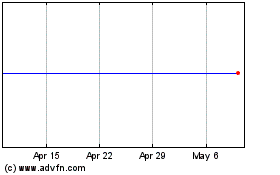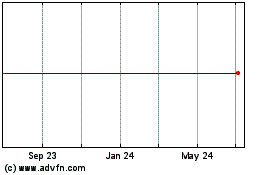By Jared S. Hopkins
A deal to merge Pfizer Inc.'s off-patent drugs business with
generic drugmaker Mylan NV caps new Pfizer Chief Executive Albert
Bourla's remodeling of one of the world's biggest pharmaceutical
companies.
In his nearly eight months at the helm, Mr. Bourla has moved
quickly to remake Pfizer into a company focused on patent-protected
prescription medicines with the potential for significant sales
growth, from a more diversified but slower-growing player.
The deal with Mylan, announced Monday, is Mr. Bourla's biggest
move so far, after he oversaw a restructuring at the company and
made smaller deals to boost Pfizer's pipeline of cancer and other
drugs under development.
Mr. Bourla, 57 years old, has also been guiding Pfizer's plan to
combine its division selling Advil, vitamins and other
medicine-chest staples with GlaxoSmithKline PLC's own
consumer-health business into a joint venture that will eventually
be spun off.
"A good gardener needs to prune the tree when spring starts,"
Mr. Bourla said in an interview. "Pfizer is in the spring of high
growth."
Mr. Bourla, a veterinarian from Greece hired by Pfizer while
doing animal-health research, became chief executive in January
after holding a variety of company roles over more than two
decades. He said in the interview he began plotting out his vision
for the company's future about a year earlier, when he was promoted
to chief operating officer and joined the board.
That vision, he said, meant tightening Pfizer's focus on
prescription medicines after his predecessor had already moved the
company in that direction by hiving off the company's animal-health
and other non-pharmaceutical assets.
Brand-name drugs and vaccines, like the company's top-selling
Prevnar pneumonia vaccine, can generate more sales and bigger
margins than off-patent medicines facing competition from
lower-priced generics. Yet off-patent products have been reliable
sources of billions of dollars in cash flow for Pfizer, and as it
knows well, R&D can be risky.
Pfizer executives are convinced the bet is a good one, after
years of cultivating the company's pipeline and with the
opportunity to increase sales by mid- to high-single-digit
percentages, after years in the low-digit percentages.
"Our compass is growth, top-line growth," Mr. Bourla said.
Pfizer's recent history of slow sales stemmed from the loss of
patent protection for a raft of big-selling drugs, like Lipitor for
cholesterol and male-impotence treatment Viagra.
Early this year, Pfizer parked those declining brands into a new
unit called Upjohn and began breaking out its sales. Under the new
deal, Upjohn will merge with Mylan, best known for the EpiPen
emergency allergy treatment, to create a new company.
The new company, which isn't yet named, is expected to be among
the world's biggest sellers of generic and off-patent medicines
with more than $19 billion in yearly sales. Under the terms,
shareholders of Pfizer will own 57% of the new company, while Mylan
shareholders will own the rest.
Pfizer will be paid $12 billion in proceeds from new debt raised
by the new company. Its leadership will be drawn from both
companies.
Mylan Chairman Robert Coury, who will become executive chairman
of the new company, said Upjohn fits Mylan "like a glove."
The new company will be U.S.-based, a return of sorts for Mylan
after becoming a Dutch corporation in 2015 through an acquisition,
while keeping its headquarters in Pittsburgh. That deal came amid a
flurry of what are called inversions by U.S. companies, in which
they moved their corporate home overseas to lower their tax
burdens. Meantime, Upjohn was headquartered in Shanghai.
The deal is expected to close in the middle of next year. By
that time, Pfizer is expected to be a far leaner version of what it
was just a few years ago, and on its way to realizing Mr. Bourla's
vision for the drugmaker's future -- or dashing his hopes.
Part of Mr. Bourla's conviction in the benefits from such a
finely toned Pfizer stems from a Silicon Valley tour that he took
company leadership on in January. The group visited Alphabet Inc.'s
Google, Apple Inc. and Salesforce.com Inc., among other firms, to
understand their recipes for success, Mr. Bourla said.
The takeaway, he said, was each company's culture was different
but marked by employees who are inspired and a single-minded
purpose.
"Companies that stay true to their purpose perform much better,"
Mr. Bourla said.
His plan is risky, especially without the safety net that the
steady cash flow from off-patent drugs provided. Companies fail
more often than they succeed at bringing novel drugs to the market,
yet Pfizer is betting it can win approval for a number of promising
prospects.
"Any failure would potentially impact it a little bit more,
whether that's a new drug or any risk," said Ashtyn Evans, an
analyst at Edward Jones. "On the other side, the successes will
have a bigger impact, too."
Pfizer shares fell 3.8% on Monday, while Mylan jumped more than
12%. Analysts said Pfizer's drop had nothing do with the Mylan
deal, but because Pfizer lowered its guidance to reflect the
formation of the Glaxo joint venture.
Mr. Bourla said that as a child he had an affection for both
medicine and animals, which drew him to become a veterinarian.
Working in Greece, he developed an interest in commercial aspects
of animal health and was recruited. Since joining Pfizer, he has
since relocated his family across five countries.
"I never thought I would make it the way that I made it," he
said. "When the board elected me and asked me, 'What do you have to
say?' I said, 'Only in America.'"
Pfizer also reported its second-quarter results Monday. The
company's profit rose 30% to $5.05 billion on revenue that slipped
1.5% to $13.26 billion. Pfizer reported net income of 89 cents a
share for the quarter, up from 65 cents a share a year earlier.
The drugmaker lowered its full-year sales and earnings guidance
to $2.76 to $2.86 a share for the year on revenue of $50.5 billion
to $52.5 billion.
Mylan said its own second-quarter sales totaled $2.85 billion,
an increase of 2% from a year ago.
(END) Dow Jones Newswires
July 29, 2019 17:58 ET (21:58 GMT)
Copyright (c) 2019 Dow Jones & Company, Inc.
Mylan NV (NASDAQ:MYL)
Historical Stock Chart
From Mar 2024 to Apr 2024

Mylan NV (NASDAQ:MYL)
Historical Stock Chart
From Apr 2023 to Apr 2024
